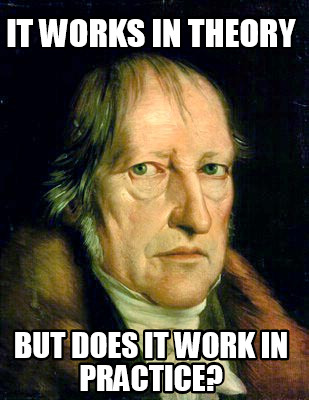Here is a short explanation of how this works:I think this what I've seen about Gulenko's cognitive styles:
- Causal-Determinist is the function f(x) = A
+ Holographical-Panoramic is the similarity, AB/XY = AC/XZ, ΔABC ~ ΔXYZ
- Dialectical-Algorithmic is the limit, lim X → ∞; f(g) = x
+ Vortical-Synergetic is the inverse matrix, so A × A^-1 = A^-1 × A = I
f(x) = A, is basically just a substantial lesson of algebra or a way to find the factor x, in that sense, Godel's Incompleteness theorem is also one of them that, in my opinion, fits CD cognitive style. Holographic, it's rather a way to synchronize the perspective of a formula to find a similar but the same result. In math, I could see HP as a sin + cos + tan that requires structure to finish the equation with relying on a certain system. If anything, to be fairly honest, I'd say the similarity theorem in geometry works the same as this one. As for DA, I would find that actually works for an equation equals possibilities in a sense that is random and closer to a limit. You could say that another good example of DA is gambling; chance, probability, statistic, ratio and odds. As for VS, I would use inverse matrix, random income but the same outcome of possibilities. Though, I still can't find a proper example for VS, hmmm, if anything, I'd use factorization due to its complication although the similar outcome.
If I were to rank these cognitions from the simplest to the most complex: CD > HP > DA > VS
VS's very complex in process but the outcome remains the same, that's how I see it. DA is like, you'd rather find that the outcome is random by chances or probabilities but the formula remains the same. And it's somewhat reverted, both VS and DA: to its simplistic form, as if DA is like x + y = z, VS is like z + y = 2x + 2y. As for CD, it's rather simple and structured due to its directness towards circumstances. HP is like, you'd rather find similarities in a way you look at the concept as a bigger overview to break down tangents of substantial process in a system, so I'd say that: to its simplistic form, as if CD is like X1 + X2 = X3, HP is like x.y + y.z = xy + yz ~ xz + yx
VS reminds me of chemistry by its structure, random but structured, the atom too. fusion-fision reactions are those. DA works like a velocity, force, and also inertia, principles of physics that are disciples of eternal energy laws. CD, as it's a total cause and effect, I could see the evolution theory as a very good example of how creatures evolve in biology, for instance, heredity. HP, in other words, math formulas, factorization, foolproof theorem, and etc, they are principled by formal logics. However, doesn't mean they can't share their "creativity" of expertized subject to another one.
I'd say the attempt of trial and error in Vortical-Synergetic exceptionally works better to create a typology system.
Unlike Dialectical-Algorithmic that relies on chances and possibilities as their odds to have a different outcome,
Vortical-Synergetic relies on their experimental attempts and butterfly effects to gain a proper result.
However, I got struck by the similarities between Causal-Determinist and Holographic-Panoramic in having a conclusion.
The domino effect of Causal-Determinist verily works better in forming an utilitarian and ethical opinions in debate.
Holographic-Panoramic relies on their constructive development by the disciple of similarities to formulate a geometrical panorama.
Causa, Cause, Causal, Causality, Deter, Determine, Determinist
Reasons that prove ~ Causal-Determinist
Dial, Dialect, Dialectical, Algorithm, Algorithmic
Contradictions that connect ~ Dialectical-Algorithmic
Holistic, Holograph, Hologram, Graphic, Panorama, Panoramic
A picture by entirety ~ Holographic-Panoramic
Vortex, Tactical, Vortical, Synergy, Energetic, Synergetic
A chaos by orderliness ~ Vortical-Synergetic




 Reply With Quote
Reply With Quote
